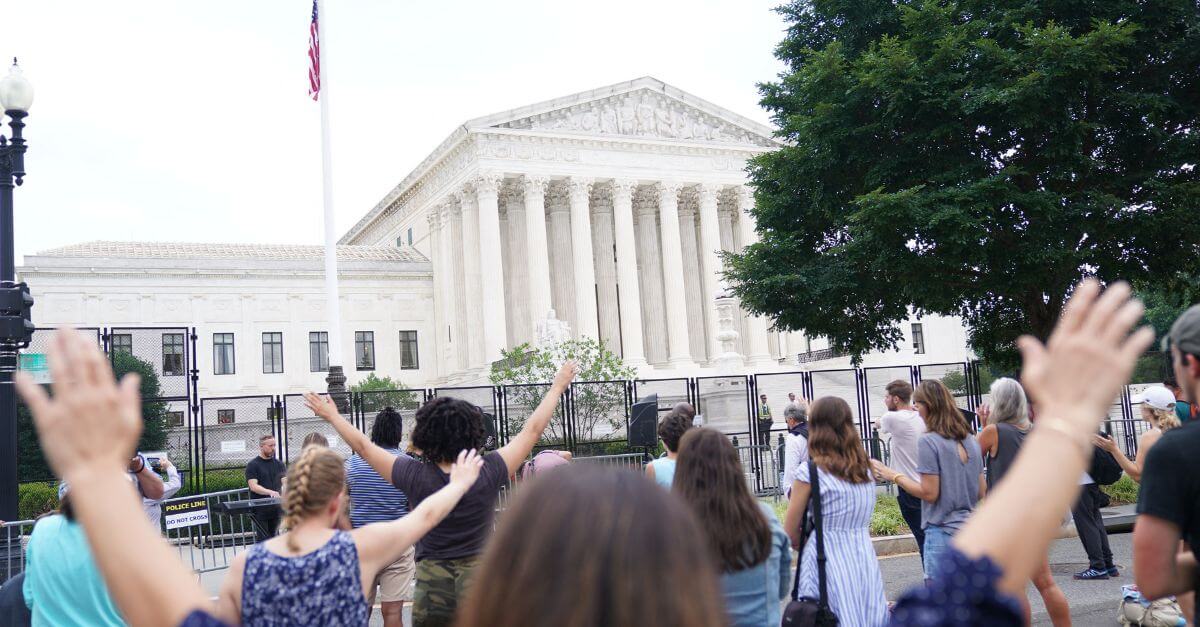The Jewish vote could swing the election in 7 key battleground states. Here’s how
Antisemitism, Israel and Jewish candidates are front and center in states where every vote counts

Swing states in the 2024 presidential election: Arizona, Georgia, Michigan, Nevada, North Carolina, Pennsylvania, Wisconsin. Graphic by Beth Harpaz; map by iStock; photos by Getty
Antisemitism, Israel and Jewish candidates are front and center in many of the seven swing states where either candidate could prevail in the 2024 presidential election.
Those states are Arizona, Georgia, Michigan, Nevada, North Carolina, Pennsylvania and Wisconsin.
And while the percentage of Jewish voters is small compared to the overall electorate, the number of Jewish voters in many of these states exceeds the number of voters who determined the winner in the 2020 presidential race.
Because Jewish voters are more likely to be Democrats, Republicans are making an extra effort to chip away at their impact and maximize Jewish GOP turnout. The Republican Jewish Coalition is spending $10 million to corral Jewish votes in swing states; the Jewish Democratic Council of America is spending $2 million on the election.
Here’s a look at the Jewish vote, Jewish candidates and Jewish issues in states where the outcome of the 2024 presidential election is a tossup between Vice President Kamala Harris, the Democrat, and former President Donald Trump, the Republican.
Arizona

Arizona has 85,000 Jewish voters, and 55% of them are Democrats, compared to 44% of voters statewide, according to the American Jewish Population Project at Brandeis University. In 2020, President Joe Biden beat Trump here by fewer than 11,000 votes. Jewish voters could be a critical factor in the 2024 outcome.
Two of the speakers at the Democratic National Convention were from Arizona: Gabby Giffords, the first Jewish woman elected to Congress from Arizona, and her husband, former astronaut Sen. Mark Kelly, who is not Jewish. Kelly, who has served in Congress since 2020, was considered a top candidate to run for the vice presidency on Harris’ ticket, but lost out to Minnesota Gov. Tim Walz. Giffords resigned her seat in 2012 after being shot in the head in a mass shooting.
Georgia

Georgia, where Biden won in 2020 by 12,000 votes, is another state where the Jewish vote could make a big difference. Georgia’s 125,000 Jews make up just over 1% of the electorate, and 75% of them typically vote for Democrats, according to the American Jewish Population Project from Brandeis.
Antisemitism has been making headlines in Georgia since well before the Oct. 7 attacks and the rise of anti-Israel sentiment nationwide.
The Anti-Defamation League says Georgia is one of a handful of states targeted by the white supremacist Goyim Defense League, which has papered neighborhoods around the state with antisemitic flyers for the last few years. The GDL also held antisemitic protests last year at a Chabad in a Marietta suburb and a Reform synagogue in Macon. Other antisemitic incidents have included threats against an Israeli-owned bakery in Atlanta and against the state legislature’s only Jewish member, Esther Panitch.
A bill designed to curb antisemitic attacks, sponsored by Panitch, was signed into state law in January.
Michigan
Michigan is home to about 100,000 Jews, comprising a little over 1% of the electorate, according to the American Jewish Population Project at Brandeis. More than 60% of Jews in Michigan are Democrats.
But Michigan also has 200,000 Muslim voters, according to EmgageUSA, an organization dedicated to mobilizing Muslim American voters, as well as more than 160,000 residents of Arab ancestry, according to the U.S. Census — more than any other state outside of California.
More than 85% of Muslim voters voted Democratic in the last presidential election nationwide. But in Michigan’s Democratic primaries this year, at least 100,000 Democrats cast “uncommitted” ballots. Those votes were part of a protest movement waged by Muslim, Arab American and other voters in a number of states against the Biden administration’s support for Israel in its war with Hamas.
Whether those uncommitted voters will stay home in November or vote for Trump remains to be seen. Either way, they could influence the outcome of Michigan’s presidential race. Biden won the state in 2020 by 154,000 votes. In 2016, Trump became the first Republican to carry Michigan since 1988.

Thirty uncommitted delegates attended the Democratic National Convention in Chicago. They unsuccessfully sought to have a Palestinian speaker at the event and at one point, staged a sit-in in protest.
A political action committee began running ads in September in Michigan trumpeting the fact that Harris’ husband Doug Emhoff is Jewish. The ads are apparently designed to stoke anti-Israel sentiment among Muslim and Arab voters and suppress their votes for the Democratic ticket.
Last year, the state’s Jewish attorney general Dana Nessel was among several Jewish public officials in Michigan targeted by a man who made death threats.
Nevada

Jews made up 3% of Nevada voters in the last presidential election, according to exit poll data, and 75% of those 41,000 voters picked Biden over Trump in 2020. Biden won the Nevada count by around 33,000 votes, so this is another race where every Jewish vote is potentially critical to the outcome.
Nevada’s U.S. senator, Jacky Rosen, a Democrat who’s up for re-election, could help turn out the Jewish blue vote. She’s currently the only female Jewish member of the Senate, a big supporter of Israel, a former synagogue president and founder of the Senate’s Bipartisan Task Force for Combating Antisemitism. She’s got a substantial lead in the polls over her Republican opponent, and Democrats know that every one of the 34 U.S. Senate seats up for grabs in this election is critical to their party maintaining control of that chamber.
North Carolina

North Carolina’s 49,000 Jews make up just 0.5% of the electorate, according to Jewish Heritage North Carolina, but Jewish concerns are making news in the state this year, thanks to the gubernatorial race between a Jewish Democrat, state Attorney General Josh Stein, and his Republican opponent, Lt. Gov. Mark Robinson.
Stein, who is leading Robinson in the latest polls, was the first Jewish candidate to win a statewide race when he became attorney general, and he would be the state’s first Jewish governor if he wins this one. Robinson would be the state’s first Black governor.
Although Robinson has denied accusations of antisemitism, he’s been called out as a Holocaust denier and for indulging in antisemitic tropes. He used the word “hogwash” to describe the Holocaust and he endorsed a podcast host’s claim that Jewish bankers are among the “Four Horsemen of the Apocalypse.” He also said an “agnostic Jew” in Hollywood made the Black Panther film to “pull the shekels out of your Schvartze pockets.”
Israel is also an issue in North Carolina. More than 88,000 Democrats, or 12% of party members, voted “no preference” in the Democratic presidential primary rather than vote for Biden. However, it’s not the first time a Democratic presidential contender has faced animosity from North Carolina voters: In 2012, 21% voted “no preference” rather than vote for Barack Obama when he ran for re-election.
But this time, the “no preference” movement is seen as a protest of Biden’s support for Israel’s war on Gaza. And while Robinson has trumpeted support for Israel — despite the fact that he’s also had to deny being antisemitic — Stein has had to tread more carefully so as not to alienate left-wing Democrats. In response to pro-Palestinian campus protests, Stein has defended the right to free speech while speaking out against violence and antisemitism; he’s also said Israel has the right to defend itself but should “minimize” the impact of the war on civilians in Gaza.
In recent decades, Republicans have had the upper hand in North Carolina’s presidential elections: Obama, in 2008, is the only Democrat to have won the state’s presidential vote since Jimmy Carter in 1976. On the other hand, Trump’s victory in 2020 was a narrow one — about 75,000 votes, or 1% of the total — so Democrats could be within striking distance this time.
Pennsylvania

With 19 electoral votes, more than any other swing state, Pennsylvania is the biggest prize among the battleground seven. Registered Democrats outnumber Republicans by about 400,000, but Biden only beat Trump there in 2020 by 80,000 votes, a 1% margin; Trump won in 2016 with an even smaller margin, about 0.5%.
The state’s 300,000 Jews make up 3% of the electorate, according to the American Jewish Population Project at Brandeis. Two-thirds of them are Democrats, so their support is essential to a Harris win.
The state has a Jewish Democratic governor, Josh Shapiro, and an outspoken ally on Israel and other Jewish issues in Democratic Sen. John Fetterman (who is not himself Jewish). Neither Shapiro nor Fetterman is on the ballot this November, but Pennsylvania’s other Democratic senator, Bob Casey, is. Casey is leading in the polls, though his Republican challenger, Dave McCormick, is trying to paint himself as a stronger supporter of Israel.
Wisconsin

Four of the past six presidential elections have been decided by less than a percentage point in Wisconsin, including Trump’s win in 2016 and his loss in 2020. The Republican National Convention was held this year in Milwaukee.
Wisconsin does not have party registration, but 48,000 people voted “uninstructed” in April rather than cast a vote for either candidate. That’s more than double the votes Biden won by in 2020 and was seen as another protest against Biden’s support for Israel’s war with Hamas.
The state’s 40,000 Jews make up less than 1% of the electorate and two-thirds of them vote Democrat, according to the American Jewish Population Project at Brandeis.
The state’s Democratic U.S. senator, Tammy Baldwin, is up for re-election this year. She’s leading her Republican challenger by a few points in recent polls. But Wisconsin voters are fickle about party affiliation: In 2022, they split their allegiance, re-electing a Republican U.S. senator, Ron Johnson, and a Democratic governor, Tony Evers.
















